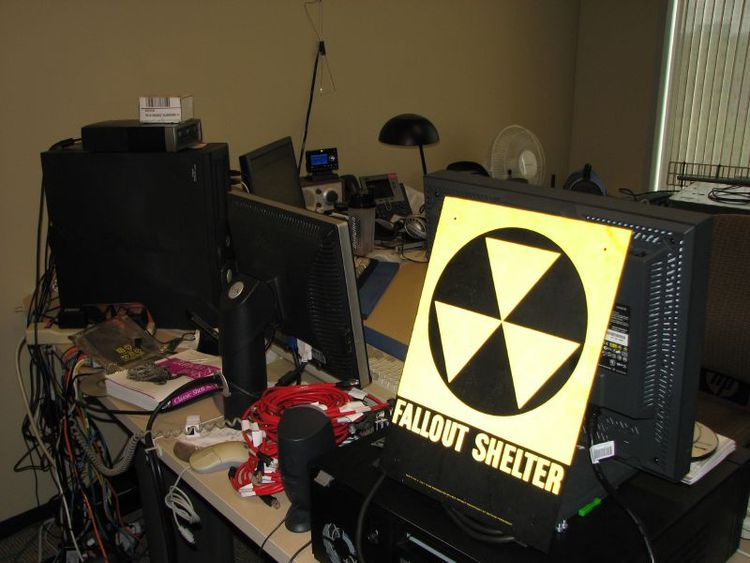Everything Has Changed. Members Only #4

NB: I unpaywalled this post in June, 2022, updating a few no-longer-valid links, removing time-sensitive info, and adding the photo from Cubs marquee – I still heart Flickr!
The first time I heard that the information age had rendered managers obsolete? 1999.
The old-enough-to-know-better-dot-com-fever-infected executive rejected recommendations for his dysfunctional team.
“We don’t need management,” he told me. “The internet has changed everything.”
I was gobsmacked. And since then, I have actively, publicly, privately, in my mind, and at every turn, resisted the (spurious) notion that This Time Things Are Different.
I’m here to say, today, that something actually is different.
Case in point:
About a dozen female executives in Wells Fargo wealth-management division gathered in Scottsdale, Ariz., in June after an internal conference. They’d had enough.
Women should be at home taking care of their children, some of the executives said they had been told over the years by Jay Welker, president of Wells Fargo’s private bank and head of the wealth-management division since 2003. Qualified women had recently been turned down for several top roles that went to male applicants. When the women raised concerns, they felt ignored.
Their frustration culminated in “the meeting of 12,” according to half a dozen women who are Wells Fargo executives and who attended the meeting or had direct knowledge of it. (The Wall Street Journal, August 31, 2018.)
Also, that time when the internet lit up about an anonymous NY Times Op-Ed about secret so-called-resistance at the White House. Michael Beschloss retweeted:

The next morning, listening to discussion at The NYT via The Daily, a Washington Post piece came to mind.
Aides sometimes plot to have guests make points on Fox that they have been unable to get the president to agree to in person. “He will listen more when it is on TV,” a senior administration official said.” (The Washington Post, April 5, 2018)
Uh, ok, a highly specific method for managing up.
Last year, I wrote about “leakage” as an indicator of an organization that has gone off the rails.
Leakage: Your organization has failed, institutionally, to effectively hear your employees; they’ve taken their concerns elsewhere for resolution.
- You receive complaints about employees from customers or vendors.
- Leavers write “goodbye everyone” emails or blog posts that stir everyone up for days.
- Former employees are bad-mouthing your company to current employees and the market.
- You’re hearing about complaint-filled alumni chat groups.
- You’re getting attorney letters related to having let people go.
- You’re seeing numerous negative reviews on Glassdoor or other online forums.
My examples of leakage are calls for reparations, after the fact. Or, revenge.
There’s a different feeling to Wells Fargo’s Meeting Of 12 and last week’s anonymous NY Times Op-Ed.
Why? They’re not straightforward whistleblower stories. They aren’t social media pile-on situations, mobs calling for someone’s job.
These stories feel more like leverage is being applied. Mainstream media is being used to try to manage leadership that’s still in place.
These stories bear the scent of people trying to get things fixed, without disturbing the status quo too terribly much.
The executives at Wells Fargo want promotions they feel are coming to them. The anonymous senior official at the White House? Maybe they want Congress to act.
Managing out, not up.
So, Anne, why don’t you get to the point?
In the face of managing out — where a clumsy, naive, communication error could ignite a PR disaster — our most junior managers must be better.
In 1999, I was being schooled for the first time on the new supposed-laws of management gravity. Leaders of the US Marine Corps were talking about the Strategic Corporal.
…the success of the Marine Corps' mission in the 21st century will depend upon the decisions of small unit leaders who are noncommissioned officers. These decisions will have strategic consequences, hence the term, Strategic Corporal. According to General Krulak, the roles and missions of the Strategic Corporal are envisioned to grow analogous to that of a second lieutenant 30 years ago. (Abstract, Recruiting the Strategic Corporal in the 21st Century (Through the Year 2010) by RD Coleman Jr.)*
Like many of the people I call emerging managers, USMC corporals are first-time leaders, in their 20s. (And yes, the military still uses this metaphor, and not just in the US. You can really fall down into the internet on this one.)
In my understanding, the assumption that led to defining the Strategic Corporal was that young military leaders would increasingly be placed into situations where they’d be on their own, making consequential decisions on the fly. Without immediate access to more experienced leaders.
As Corporate America was navigating into a world with fewer managers, and without managers, the US military was concluding that they needed to give young leaders more training and support. And around a wider range of skills and leadership competencies.
The point? The practical point.
In a room with a whiteboard and 10 minutes, we could mostly agree on basic competencies we want to see in our emerging managers.
Setting mission-aligned goals, using 1:1s to create relationship and accountability, giving actionable feedback, developing and coaching team members, and so forth.
If you haven’t discussed basic management competencies in your organization, it’s time. Because now you need to add a few new skills to the whiteboard.
Like, the art of giving constructive feedback when a recording device may present. The need to respond to concerns before a well-meaning employee decides to take it elsewhere. Simply because maybe it might be a good way to get a problem solved.
(Tbh, you may already be seeing this on sites like Glassdoor. Spoiler alert: solving the problem does not involve getting friendlies to post positive reviews.)
And you need to upgrade your strategy for building your management bench. Because these refined management skills are best learned from people who already have them, and demonstrate them. People who have led teams for thousands of hours.
These events also point to a need to reconceive our networks.
Network nodes aren’t always people who are 1, 2, 3 degrees of separation from us on Linked In. The nodes aren’t always even people.
Missionwashing, Part 1
I’ve been thinking about why we get burned out at work. My working hypothesis is that when we take time to align with our highest purpose — on a personal level — it’s easier to draw a good boundary around work.
Before I went off on a tear about managing out, my plan for this time was to write about something I think I’ll be calling “missionwashing.” (Inspired by Fred Benenson’s portmanteau.)
Fred Benenson: Mathwashing can be thought of using math terms (algorithm, model, etc.) to paper over a more subjective reality. For example, a lot of people believed Facebook was using an unbiased algorithm to determine its trending topics, even if Facebook had previously admitted that humans were involved in the process. (Technical.ly Brooklyn, Jun. 8, 2016)
My working definition of missionwashing: the organizational use of “purpose” — or mission — as an excuse to cut corners. Maybe an organization doesn’t pay employees fairly, or asks people to give up their lives outside of work for extended periods. Or they ask people to work in environments where ethics, morals, and/or social norms are violated. And all the while, they’re “changing the world.”
I will come back to this.
In the meantime, have you seen “missionwashing” in action?
Let’s Talk About the WSJ
In 2017, I started actively subscribing and paying for things that I loved, used, and wanted to see in the world. And also, journalism.
(Though I haven’t yet paid money for The Washington Post. #SorryJeff.)
A few months ago, I re-subscribed to The Wall Street Journal for the first time this century.
WSJ reporting is on point, again and again. They get deep into a company’s business, as I saw when reading about Wells Fargo — from sexist senior execs, to what might be systemic ethics problems.
My reaction to news of the Colin Kaepernick ad campaign was to immediately and cynically recall Nike’s current issues with female executives and managers. The WSJ reporter on the Nike beat didn’t let them off the hook, either.
In recent months, Nike has been grappling with the fallout of an internal scandal in which nearly a dozen executives left the company amid complaints of inappropriate workplace behavior. Last month, two former Nike employees filed a lawsuit alleging gender discrimination and detailing specific accounts of alleged harassment. (WSJ, September 4, 2018.)
Work and Family columnist Sue Schellenbarger is a national treasure, these days sharing practical “how to have a job” wisdom. Often not behind the paywall.
Confession: I’m getting the print edition. I found a deal where it was a dollar more per month than online. That’s how I discovered their Books section, which has been a delightful surprise.
Other papers may break stories more often, but WSJ goes deep on both the numbers, and on the human side of the workplace.
Sometimes I’m going to share links that go behind WSJ paywalls. If you’d rather not subscribe, your library might provide you with access from home.
#recommend.
(Yes, I find myself consternated by their editorial pages. I can be equally vexed by NY Times editorials, for different reasons.)
Links
- The Strategic Corporal: Leadership in the Three Block War, by Gen. Charles C. Krulak Marines Magazine, January 1999. Though jargon heavy, it is brief and hits the points.
- Get Your Life is a practical, slim, volume about setting your personal mission, and more. Author Dr. Norissa Williams is not a white man, which sets her apart from the pantheon of writers out there on this topic. (2022 update, this book no longer seems to be available from Dr. Williams' website.)
- Microsoft to business partners: if you want to work with us, offer paid family leave. Enough said.
Office Hours
I’ve been loving Office Hours! As I’ve said, they won’t scale, and so won’t be here “forever.” For now, they’re working well.
I’ve really enjoyed our conversations. Thank you. If you’re a Supporter, here’s how to engage.
- Any time: book a 45-minute time slot for September 27th, familiarize yourself with the Chatham House Rule, on creating conversation that’s not for attribution.
- About 1 week beforehand: receive my questions about what you want to discuss, and respond to me.
- When I receive your response: I’ll send you a Zoom link for the call.
- September 27th: login to the call!
Thanks so much for reading and supporting On Management.
Anne Libby
*June 2022 note: my 2018 link here was dead and I couldn't find the article or abstract – so my update uses an archived link, courtesy of archive.org.





